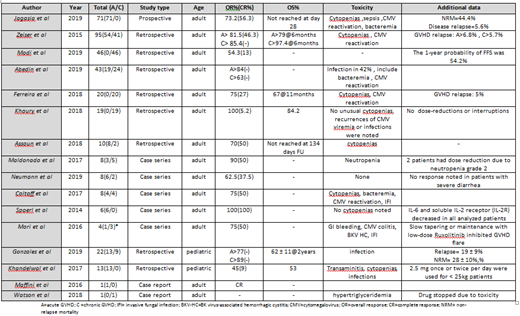Background: Graft versus host disease (GVHD) is a main cause of morbidity and mortality in patients having undergone allogeneic hematopoietic stem cell transplantation (HSCT). About 30-40% of patients have steroid‐refractory GVHD (SR‐GVHD) after the first‐line use of high doses of corticosteroids with a poor prognosis .Ruxolitinib is a promising treatment for SR-GVHD. However, data regarding optimum dosing, response rates and associated adverse events are scarce. Herein, we provide the first systemic review of literature for the use ruxolutinib in GVHD.
Methods: A Medline (PubMed), google scholar, OVID and Cochrane Database of Systematic Reviews search using key words "Ruxolutinib and GVHD", "Ruxolutinib and SR-GVHD" was undertaken in June 2019. Only peer reviewed databases were searched and search was restricted to human studies of acute and chronic GVHD only.
Results: 16 publications, as listed in Table 1. Only one was a prospective trial, all others were retrospective studies, case series (5), and case reports (2). Overall response, ranged 45% - 100%, complete response was noted in 5.2% -80% patients. Time to response was variable from 1-12 weeks. Cytopenias and infectious complications were frequently reported with dose reduction or interruptions needed in most studies. Maintained responses were reported in a small proportion after ruxolutinib discontinuation.
Conclusion Ruxolutinib has promising efficacy in SR-GVHD , however cytopenias and infectious complications reported frequently mandate close monitoring. Results of ongoing prospective trials could provide answers for optimum dosing and response assessment, and management of related adverse events.
No relevant conflicts of interest to declare.
Author notes
Asterisk with author names denotes non-ASH members.


This feature is available to Subscribers Only
Sign In or Create an Account Close Modal